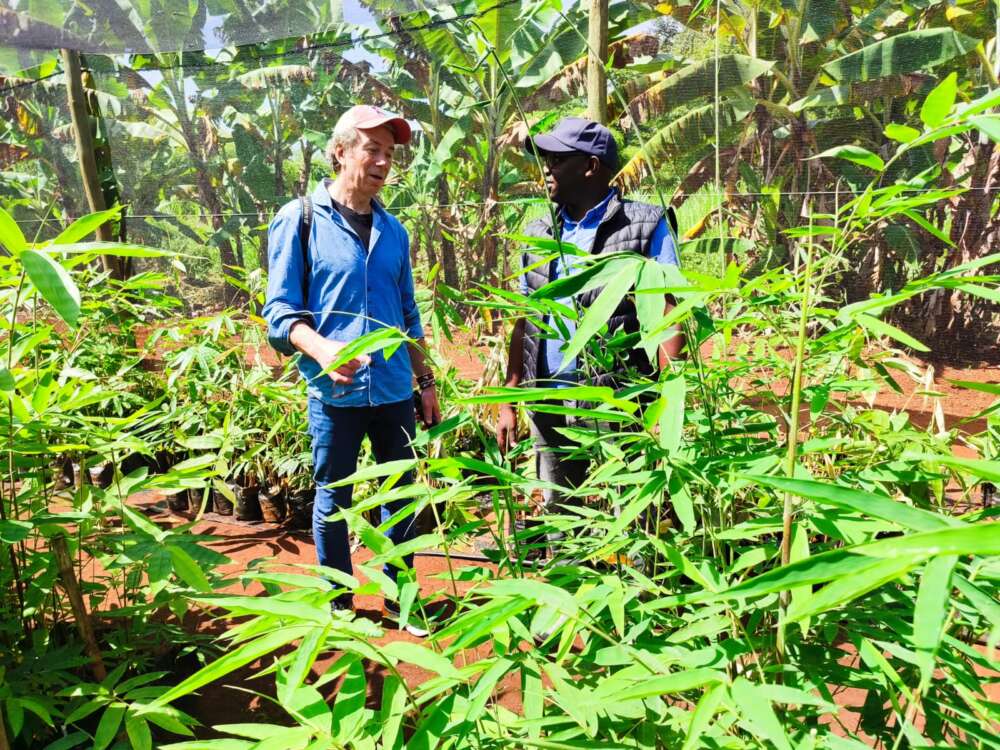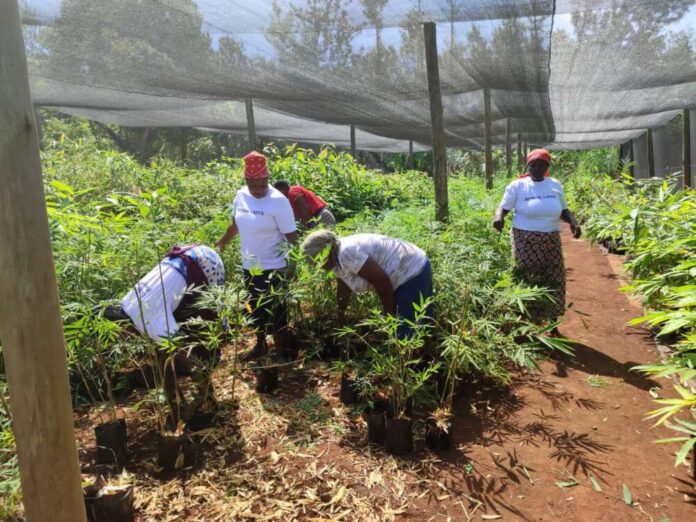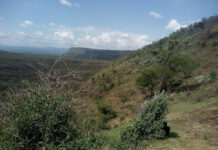By Rebecca Wangari, DevReporter, Murang’a County

Key Highlights
- Efforts have intensified to increase forest cover in Kenya as a strategy to combat climate change.
- “Bamboo for Kenya” seeks to promote bamboo cultivation in the country as a means of conserving natural forests.
- Bamboo can be used to create various products, including utensils, fencing poles, and tiles.
In recent years, efforts have intensified to increase forest cover in Kenya as a strategy to combat climate change.
The government has set an ambitious target of planting 15 billion trees by 2032, aiming to raise forest cover to 30 percent.
However, the continued harvesting of trees for timber, firewood, charcoal production, and other industrial uses, poses a significant challenge to maintaining the recommended forest cover.
“Bamboo for Kenya”
The Base Camp Foundation has launched an initiative called “Bamboo for Kenya,” which seeks to promote bamboo cultivation in the country as a means of conserving natural forests.
This initiative is spearheaded by the Kamahuha women’s group, which manages a bamboo nursery that sells seedlings to local residents and other regions.
This nursery is unique in that it imports and propagates bamboo seeds rather than relying on cuttings, as is common in other nurseries.
Celina Njeri, the chairlady of the group, stated that they have received training in bamboo cultivation and intend to share this knowledge with their community.
Njeri explained that they previously cultivated exotic trees but found them unprofitable. They have since adopted bamboo as a way to address climate change and alleviate poverty.
Various Products
According to Njeri, bamboo is an excellent source of biomass, and its tender leaves can serve as fodder.
Bamboo can also be used to create various products, including utensils, fencing poles, and tiles.
“We are encouraging people to adopt bamboo farming as it provides environmental benefits and can also serve as a source of livelihood,” Njeri emphasised.
Samuel Kariuki, the project manager, noted that the demand for bamboo in Murang’a County far exceeds current production levels.
He added that the “Bamboo for Kenya” initiative is focused on promoting bamboo cultivation, with plans to establish a factory for manufacturing bamboo products.
He also urged for the implementation of the National Bamboo Policy 2022, designed to encourage bamboo farming in both forests and on farms.
“We urge the government to promote bamboo growing in the country, as it is one of the best ways of combating climate change,” Kariuki remarked.
Indigenous Bamboo
Ole Bernt, the founder of Base Camp, emphasised that they are also advocating for the planting of indigenous bamboo in Kenya for its conservation and potential economic benefits to local communities.
He noted that globally, the cultivation of bamboo for industrial use is increasing as it serves as an alternative to traditional timber and other products.
He also noted that approximately 90 percent of the rural community relies on firewood for cooking and heating.
However, the harvesting of firewood and charcoal burning poses a significant threat to indigenous forests and biodiversity.
“Bamboo grows very quickly and is not uprooted; only the stems are harvested, with up to 40 stems per plant, making it an ideal source of firewood,” he explained.
Imposed Ban
In 1986, a ban was imposed on harvesting bamboo from natural forests, leading to a scarcity of bamboo resources for value addition and processing. This resulted in the underdevelopment of the bamboo sector in Kenya.
Ole Bernt noted that during this time, some knowledge about bamboo was lost. He adds, however, that research efforts have increased to bridge this knowledge gap.
Selah Nandamba, Chief Executive Officer of Base Camp, mentioned a pilot bamboo project in the Maasai Mara conservancy and expressed intentions to expand it to other areas.
“Traditionally, bamboo has been known to thrive in wetlands, but some species can grow even in relatively dry areas,” she said.
“We have gained substantial knowledge about which species can thrive under various climatic conditions in the country,” she added.
She also emphasised that bamboo acts as an eco-warrior, and scaling its cultivation across different areas of the country could represent a significant milestone in climate change mitigation.







